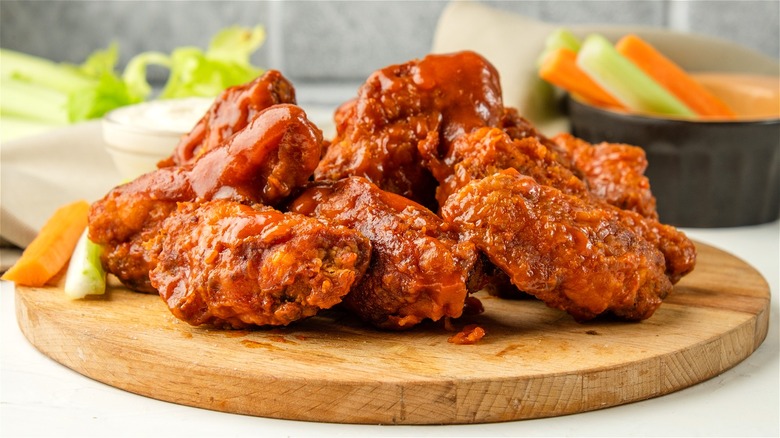What Your Spicy Food Tolerance Says About You
At various points in time, each one of us emerged into the colorful world of food-related choices; We have all, in return, heard the tell-tale phrase "you are what you eat" at least once since birth. From the small round baby refusing muted pea soup, to the child who always ate her cookie before her flattened sandwich in the school cafeteria, we can't deny the ever-present connection between what we choose to eat and how these choices fit our unique personality traits. According to the Harvard Business Review, there may be more than a sliver of truth behind the claim that what we eat says a lot about who we are. Maybe there's an inherent connection between your mom's love of homemade baked mac and cheese and her inherent cheerful demeanor. What about your distaste or obsession with spicy food? Is there a link between your obscure hot sauce collection and how you choose to live your everyday life?
Most of us are privy to the time in history when spicy food contests were a thing. Even though their popularity has since waned, most of us can agree the prospect of eating 25 wings drenched in habanero hot sauce takes a certain type of person. Before diving into what our spice thresholds say about our personalities, let's look at the physical reaction that occurs in the body when we consume spicy food.
Chemical compounds are responsible for our reaction to spicy food
You probably won't be surprised to hear that there's quite a bit of science supporting why some people like spicy food. When you consume foods with a decent amount of heat, your taste receptors may feel triggered but all in all, what you're really experiencing is a full body response. Capsaicin, which is a molecular compound contained in most chili pepper varieties, triggers our taste receptors when we eat spicy foods. Another compound is allyl isothiocyanate which creates the spice in wasabi. Unfortunately, however, these spice-sensing receptors are not just felt in the mouth and can play cruel mind tricks. The false feeling of overheating can transfer to other surface areas of the body, causing your nervous system to panic and in turn, work to cool your body down. Eating foods riddled with spice is a full-body experience and can be quite scary for some food lovers.
What causes the discrepancies in the harshness of capsaicin and other spice-loaded molecules has everything to do with the TRPV1 taste receptor located on your tongue, per McGill University's Office for Science and Society. Every human being is different and may have a TRPV1 receptor that is way more sensitive to spice than someone else's. However, research suggests the more exposure someone has to capsaicin, the higher their spice threshold becomes. Now that you have a better understanding of the physical reactions that take place when chowing down on your favorite hot wings, what type of people choose spicy foods?
Spicy food could mean a spicy sense of adventure
While there may be one sweet method to tame food that's too spicy, it's okay to lean into your favorite buffalo chicken sandwich, especially if it's fueling your sense of adventure. According to a 2022 survey conducted by Frank's Red Hot in conjunction with OnePoll, over 60% of 2,000 participants claiming to enjoy spicy foods consider themselves unique and bold individuals that have a reassuring sense of contentment with their lives (via Martha Stewart). Those who don't enjoy spicy foods tend to describe themselves as timid and less adventurous.
Some researchers go even further in one 2017 study published in the "Journal of Experimental Social Psychology," suggesting there is a significant overlap in people's enjoyment of spicy food and their susceptibility to aggressive behavior. That may be a stretch to those of you who love a good amount of spice in your meals. You may never in your life reach the daring levels of Guy Fieri when he consumed 10 extremely hot wings on camera for the YouTube show, "Hot Ones." However, those who consume spicy dishes with a smile can still see the experience as pleasurable versus dangerous. And with this enjoyable consumption comes more confidence, adventure-seeking behaviors, and overall happiness. So maybe you're not the biggest fan of foods that make your tongue burn. Yet trying a bite or two in small amounts over time can increase your desire for more of life's spontaneity. What do you think?


